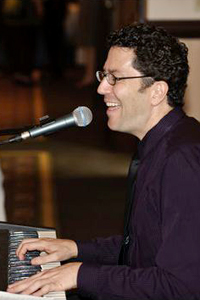Rene Pfister
For media inquiries, please contact Media Relations
As a performer, director, pianist, violinist, and children’s theater writer, Rene Pfister has produced over 300 original songs and 32 musicals and cabarets in his 30 years of work. Since coming to Berklee, Pfister has created a number of new musical theater initiatives in addition to strengthening existing programs. In 2015, he created the Musical Theater for Young Audiences Program, which reaches out to Boston Public Schools and family audiences with a new, original musical each year. In 2016, Pfister directed three sold-out performances of In the Heights, a first for the Berklee musical theater community. In 2017, he helped to create the musical theater performance minor, with classes from the musical theater programs at both Berklee College of Music and Boston Conservatory at Berklee.
Pfister studied nonviolence in India and on the Lakota reservations in South Dakota. In addition to being a member of the diversity council, he has worked on a number of initiatives for increasing diversity awareness at Berklee. He has also performed and taught internationally in Europe, China, Africa, and India. Pfister is currently working on a new global program called Broadway around the World, which will have partners in China and Africa. In fall of 2017, he was an ambassador for Berklee and adjudicator for the Valeria Lynch 2017 Music Congress in Buenos Aires, Argentina.
- Founder and president, Make Your Life a Musical
- Artistic director of the Berklee Theater Arts Collaborative (BTAC)
- Cofounder and director of the BTAC 48-Hour Theater Project
- Founder and director of the Cabaret at Cafe 939 series
- Producer of the Musical Theater Ensemble at Berklee
- 2018 ETUDE faculty scholar (the Enhancing Teaching through an Understanding of Diversity and Equity program is a collaboration between Berklee faculty development and Diversity and Inclusion)
- Produced four original works in the last five years, including his adaptations of Pinocchio, Alice in Wonderland, The Emperor’s New Clothes, and Shakespeare’s A Midsummer Night’s Dream
- Composer in residence and director of musical theater at Summer Fenn Musical Theater Program
- Volunteered with Gracenotes Habitat for Humanity trip to New Mexico, 2018
- Composer in residence at the Concord Youth Theater
- Guilford Sound Recording Residency, 2015

